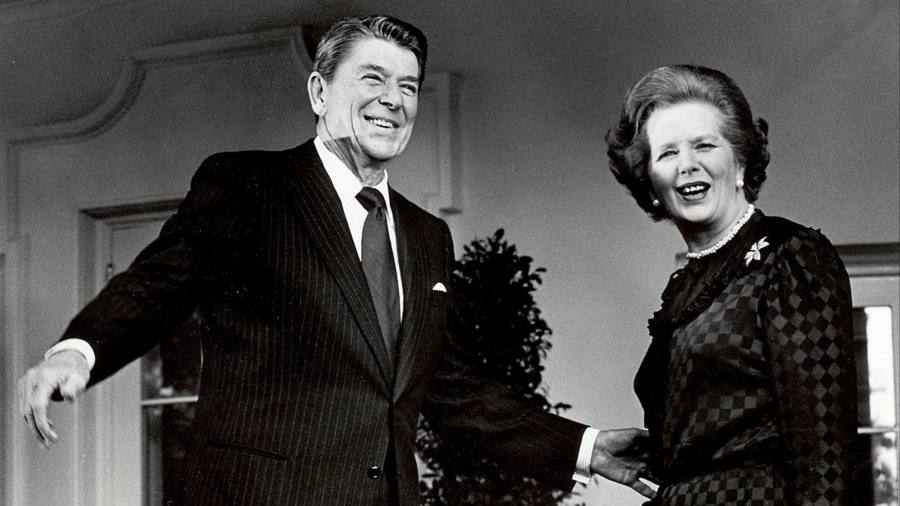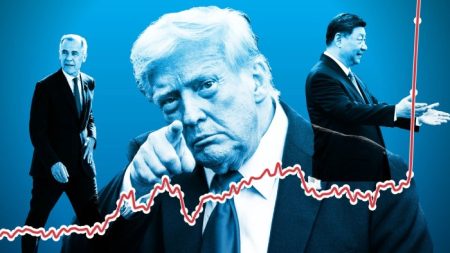Receive free US politics & policy updates
We’ll send you a myFT Daily Digest email rounding up the latest US politics & policy news every morning.
The writer is executive director of American Compass
Ronald Reagan and Margaret Thatcher’s agenda of tax cuts, deregulation, trade expansion and union busting emerged more than 40 years ago as a remedy for the economic struggles of the 1970s. But with success came elevation to dogma, as a generation of conservatives believed that “economic freedom” was all that capitalism required.
Such blind faith inevitably fostered policy failures. Unnecessary tax cuts fuelled deficits rather than growth. Lax regulation invited a global financial crisis that led to a great recession. Free trade with China yielded massive imbalances and deindustrialisation. With worker power gutted, wages stagnated. Now this stale orthodoxy, unresponsive to the challenges of a new era, has begun fading into obscurity.
The problem is not with this trajectory — there’s no shame in the intellectual exhaustion of a successful ideological project — but with the frustration for those left behind. A movement premised on the belief that victims of a changing economy could simply shift into new industries and jobs now faces that challenge itself.
A statement of principles released last week by a veritable who’s who of the “old right” personifies the plight. The group includes leaders from business-aligned institutions like the American and Competitive Enterprise Institutes, editors from National Review, anti-tax crusader Grover Norquist, strategist Karl Rove, and commentator George Will. They have a brand, “Freedom Conservatism,” and even a logo. What they lack is anything to say.
The statement is, like a classic episode of the sitcom Seinfeld, a show about nothing. Who, for instance, disagrees that “the President should only nominate policymakers and judges who are committed to upholding [constitutional] rights” or that “most individuals are happiest in loving families”?
Principles are not policy proposals, but to be useful they must acknowledge trade-offs and give some direction when applied. Instead, the signatories deliver lofty paeans that invariably dissolve into vague mumbling. “The skyrocketing federal debt . . . is an existential threat to the future prosperity, liberty, and happiness of Americans.” Freedom conservatives thus “commit to building a constructive reform agenda that can restore America’s fiscal sustainability”, without giving the slightest indication of how to approach that task.
The statement declares that “America is exceptional because anyone — from any corner of the earth — can seek to live in America and become an American”. But it calls only for immigration policy to be “rational” and “built on the rule of law”. Under the heading, “the shining city on a hill”, the statement says: “Americans are safest and freest in a peaceful world, led by the United States, in which other nations uphold individual liberty and the sovereignty of their neighbours.” This is the think-tank equivalent of ageing rockers singing “We Are the World”.
The issues here are important ones, hotly debated on the American right. After decades spent pushing tax rates ever lower, does fiscal responsibility now demand increases? Should immigration be accelerated in pursuit of higher growth and lower prices, or restricted in those segments of the labour market where wages have lagged? Nations do not in fact always uphold liberty and sovereignty, so what best ensures the safety and freedom of Americans? Other conservatives are working on more robust responses to contemporary challenges that might actually address America’s problems. But there is little substantive thinking in freedom conservatism beyond a desire to appear thoughtful.
They also, to be fair, have a desire to defeat “authoritarianism”, which the statement warns “is on the rise both at home and abroad”. From that vantage point the exercise is perhaps more understandable. Freedom conservatives are promoting an aesthetic — one that affirms their tribal loyalty and virtue. Market fundamentalism has little to say about the economic challenges of the 21st century but, by changing the conversation to one about creeping authoritarianism, the reciters of uncontroversial truisms can proclaim themselves brave truth-tellers. Insofar as they really just wish to remind us of their disdain for Donald Trump, they needn’t have used so many words.
The irony is that, to the extent that a destabilised politics has opened the door to anti-democratic forces, the old right’s market-based dogmas bear a substantial portion of the blame for the destabilisation. And in their refusal to offer any coherent alternative to what they see as authoritarianism, freedom conservatives only make its rise more likely.
Read the full article here














